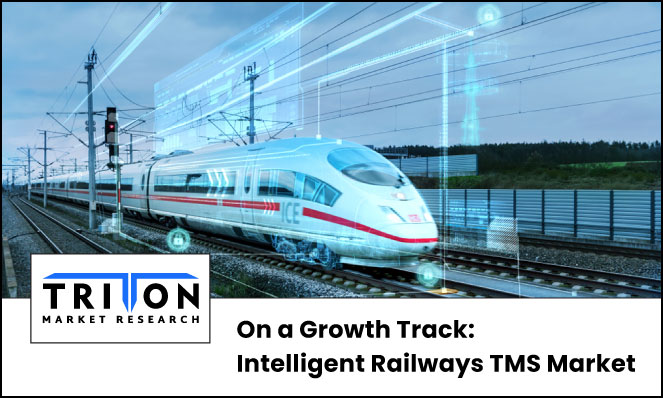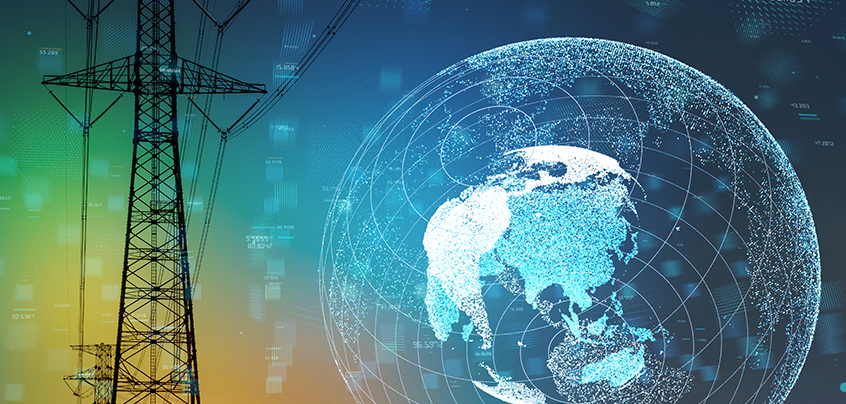



05, April 2023

Smart transportation and smart city traffic management have revolutionized the approach toward urban mobility. Compared to other transportation modes, railways are the largely preferred choice for mass transit. Moreover, rail transport also plays a vital role in the conveyance of freight over long distances because of lower costs. The global intelligent railways transportation management systems market is thus anticipated to grow due to the need for effectively planning, conducting, and optimizing these processes.
According to Triton Market Research’s experts, the market is likely to advance with a CAGR of 10.95% in the forecast period from 2023 to 2030. Rising population and hyper-urbanization are key factors driving the market. For instance, various schemes are being implemented in India, for the development of local trains, mono railways, metro railways, and even hyper-loops across major cities to ensure seamless transit. This is expected to favor the adoption of “smart solutions” for transport management.
The rising population, rapid urbanization, and increased movement call for the remodeling of urban infrastructure and transport networks. In the last three decades, the average commute distance in France has increased by a whopping 63%. The surging demand for efficient movement has led to the development of the Grand Paris Express rapid transit system.
The envisioned project involves the construction of an automated metro system, with 4 additional lines, expansion of 2 lines, and 68 new interconnected stations, with an aim to serve 2 million passengers every day. Automation is a key trend driving software development in the passenger transit and freight spaces, and railway transportation management systems are rapidly adopting this approach.
Thus, infrastructural developments and penetration of digital solutions in the railway sector are driving the Europe railways transportation management systems market. It is the leading region globally, accounting for the highest revenue of $14983.16 million in 2022.
The rapid growth of digital technologies has spurred innovation across industrial operations, and is expected to enhance passengers’ experience, which is a top priority for the railway sector. The way they plan their commute and leisure travel has been transformed by the use of smartphones and the internet.
Passengers look for comfort, speed, convenience, reliability, safety, and personalized experience before opting for the rail transit mode. This has increased the demand for real-time information and seamless connectivity with other transport modes, and a more interconnected travel experience.
As a result, major vendors are working on the technical integration of rail services with other transport modes, which is expected to largely benefit the global intelligent roadways transportation management systems market.
The growing smartphone and internet penetration has led to an increase in online shopping, and many businesses are thus promoting the e-commerce model. Due to the e-commerce boom, transportation of goods has skyrocketed in recent years and is expected to observe continued demand in the long term as well.
In view of this, vendors are increasingly investing in improving and optimizing their logistics and order fulfillment capabilities. For instance, in 2022, Amazon spent $83.5 billion in shipping costs and $84.3 billion in fulfillment costs. The growing investments by freight transportation enterprises to optimize their key operations and manage all business requirements are expected to augment the demand for intelligent railways TMS.
Founded by a logistics sector innovator, Kuebix LLC offers a modular, intuitive, and scalable TMS platform that supports all transportation modes. Called Freight Intelligence™, this offering by the leading market player enables end-users to capitalize on supply chain opportunities with the aid of predictive analytics.
Several advanced technologies, such as sensing systems and video vehicle detection systems, are being integrated into intelligent transportation management systems. Wireless sensor networks are deployed in IRTM systems for gathering data. With large accumulated data sets and advanced analytics tools, sensors help railway networks identify key data trends and use this information to improve operations & safety.
Sensors is expected to observe the fastest growth rate in the hardware segment, with a CAGR of 11.65% during 2023-2030. Hardware is an essential component of intelligent railway TMS, along with software and service.
The development of smart sensors, along with other advanced technologies, such as radio frequency identification (RFID) and the Internet of Things (IoT) , is helping enhance the functional capabilities of IRTM systems. The impact of IoT in railway traffic management is anticipated to be enormous, as cities and municipalities worldwide incorporate wireless technology. It enhances the reliability of cellular networks, which is now at par with that of traditional wired networks, thereby opening up possibilities that did not exist until a few years ago.
Increased investments by the railway sector to leverage IoT technology will help in not only optimizing operations, but also enhancing energy efficiency, reducing environmental impact, and encouraging sustainability-oriented decisions, thereby boosting the circular economy. IoT adoption helps meet sustainable development goals of improved management, reduced energy consumption, decarbonization, and more effective utilization of the available assets.
The EU Green Deal framework published in July 2021 calls for a shift to railways with a sustainable and smart mobility strategy. Also, emphasizing its green economy priorities, Chile’s second-largest metro system in Santiago is committed to cater to its systems requirements by obtaining 60% of energy from solar and wind projects. Such efforts to promote responsible, safe, smart, scalable, and sustainable urban mobility solutions will change the game for the intelligent railways transportation management systems market.
Automated ticketing, passenger information management, automated traffic control, and other applications.
Q 2) What is a major challenge faced by the IRTMS market?The high deployment costs of IRTM systems are a major challenge in the path of market growth.
Image Source: bit.ly/3zyytNk

Prevalent cases of terrorist attacks in today’s world is increasing the need for severe standards of security for public safety, and the global market for biometric technology scrupulously accommoda..
Prevalent cases of terrorist attacks in today’s world is increasing the need for..